How to Use—Draft Translation (AI-Generated)
Contents
- ① Full-text Search
- ② Facets
- ③ Search Results
- ④ Detail Information
This database comprises: basic information on scriptures included in the Taishō Tripiṭaka; a comparative table of the entries on base and collated texts recorded in the Catalogue of the Collations for the Taishō Tripiṭaka and in the footnotes of each volume of the Taishō Tripiṭaka; detailed information; and bibliographic data, images, and text data. Some records also link to databases created by external institutions.
The basic usage is as follows.
① Full-text Search
You can search by Text ID (a unique identifier assigned to each manuscript or printed edition used as a base or collated text), scripture number, scripture title (including alternate titles), translator/author, entries on base/collated texts and notes from the Catalogue of the Collations for the Taishō Tripiṭaka and the footnotes to each Taishō volume, publisher/scribe, holding institution, and more.

② Facets
This is the filtering function. You can run advanced compound searches by selecting items such as volume number, division, distribution unit (part), publication date, translator/author; entries from the Catalogue of the Collations for the Taishō Tripiṭaka (base/collated, ❹ Base and collation Texts); entries from the footnotes to each Taishō volume (base/collated, text); holding institution (from the Kan’dō Mokuroku and footnotes); and whether images are available.

In Facets, you can refine results using keywords and checkboxes.
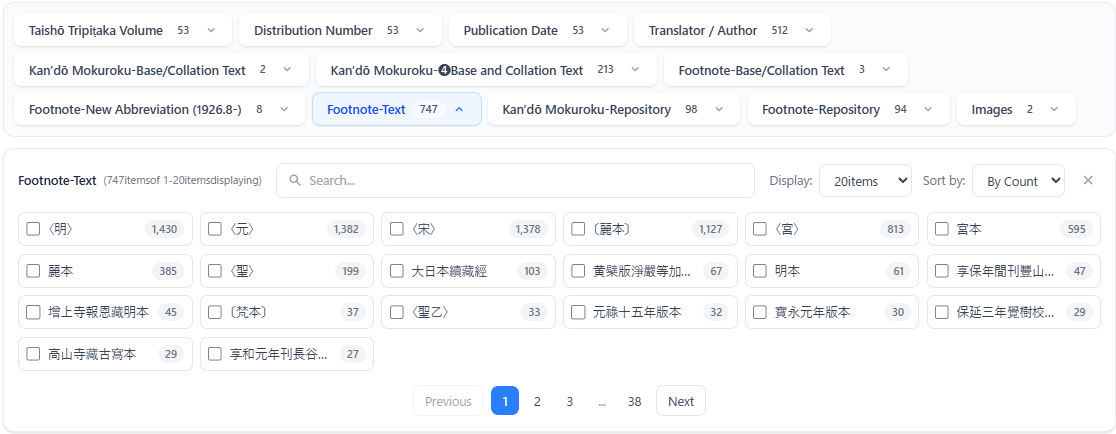
③ Search Results
Search results display four blocks side by side: Basic Information, the Taishō Tripiṭaka Kan’dō Mokuroku, Footnotes in Each Volume of the Taishō Tripiṭaka, and Detailed Information. Information on the texts for each scripture recorded in the Kan’dō Mokuroku and in the Taishō footnotes is presented in a comparative view.

You can download the search results as a CSV file.
【Basic Information】
Basic bibliographic information for the scripture: Taishō Tripiṭaka number, title, volume number, division, distribution number, and the first edition’s publication date. Clicking the “>” to the right of the title (red box) reveals alternate titles, fascicle, and translator/author.

【Taishō Tripiṭaka Kan’dō Mokuroku】
This section shows—out of the information recorded for scriptures in the Taishō Tripiṭaka—the entries relevant to base and collation texts as given in the Taishō Tripiṭaka Kan’dō Mokuroku.
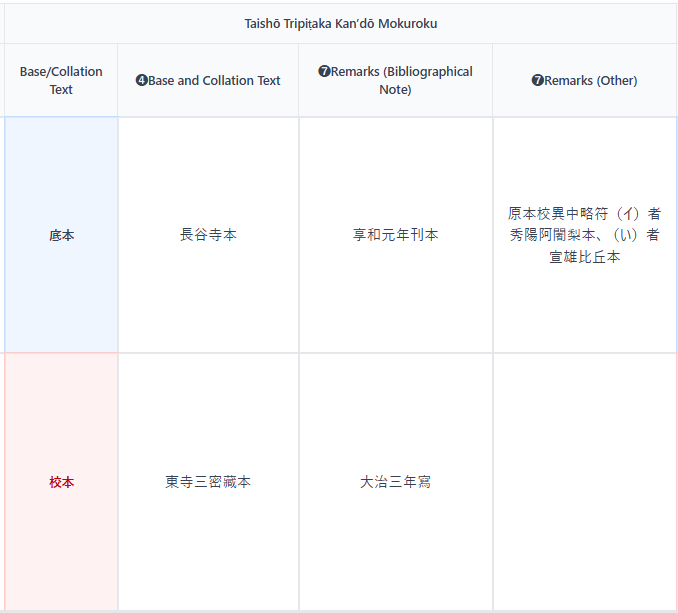
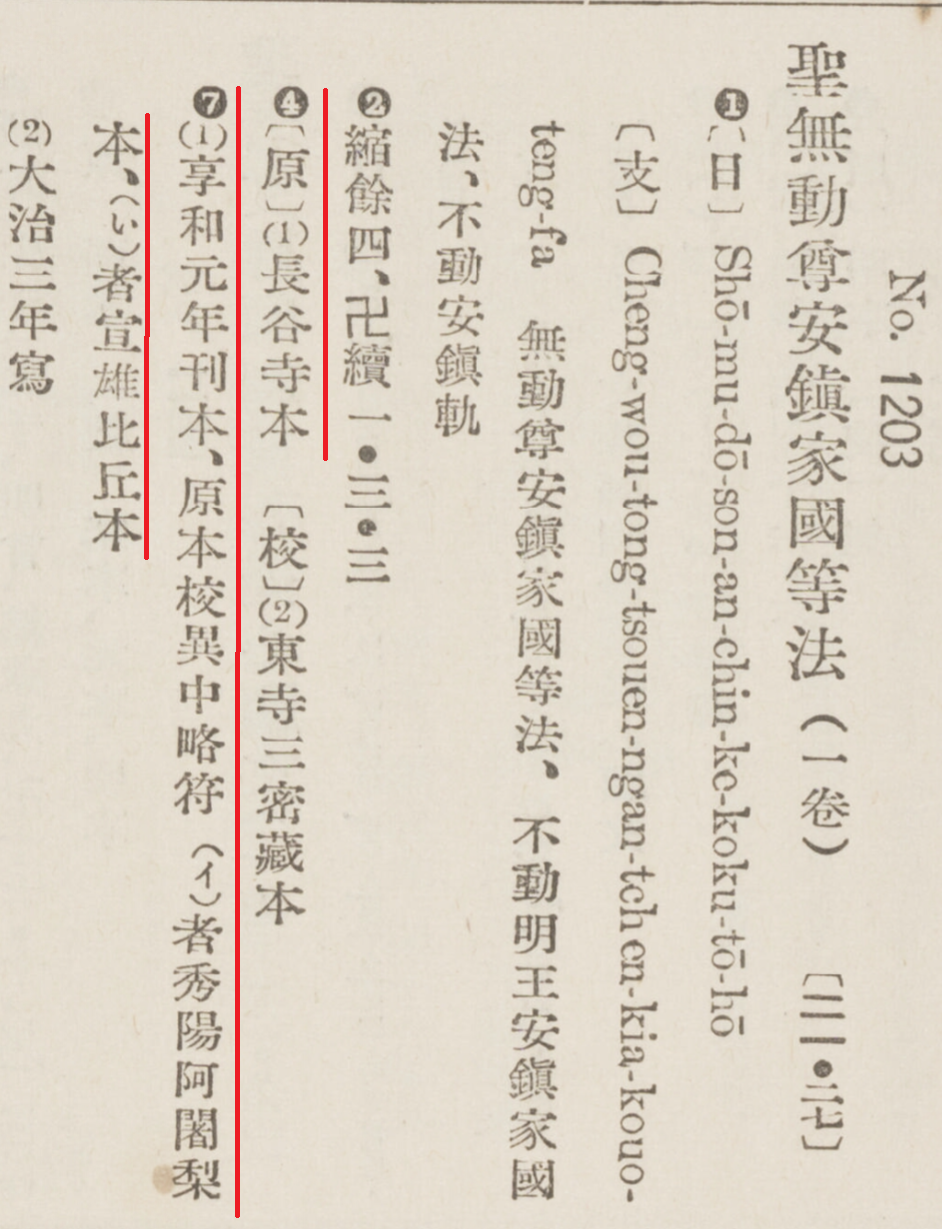
| Item | Description |
| Base/Collation Text | Displays whether the entry is a base text or a collation text. |
| ❹Base and Collation Text | Shows the texts used as base and collation texts. |
| ❼Remarks (Bibliographical Note) | Displays the portions of note ❼ that pertain to bibliographic information. |
| ❼Remarks (Other) | Displays the portions of note ❼ that are not bibliographic. Some entries include working notes created during database construction. |
【Taishō Tripiṭaka Footnotes】
This section shows the information on base and collation texts recorded in the footnotes of each Taishō Tripiṭaka volume.
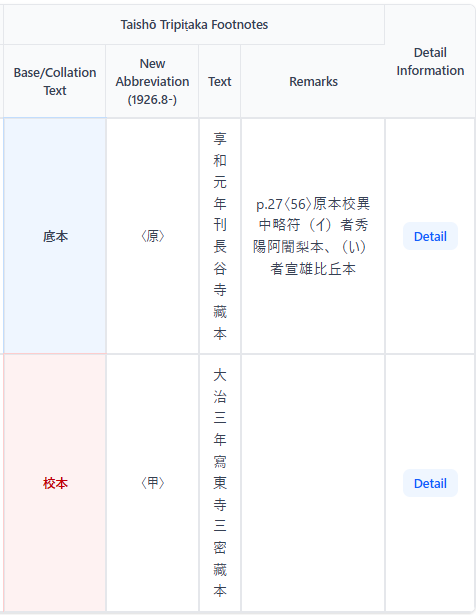

| Item | Description |
| Base/Collation Text | Displays whether the entry is a base text, a collation text, or “not included.” “Not included” indicates a text that was not incorporated into the Taishō Tripiṭaka (currently only Kyūhon 595 types). |
| New Abbreviation (1926.8-) | When the footnotes use abbreviations such as <原>, <甲>, <乙> to indicate unspecified texts, those abbreviations are displayed here. |
| Text | Shows the texts used as base and collation texts. |
| Remarks | Displays information in the footnotes other than bibliographic details. Some entries include working notes created during database construction. |
【Detail Information】
Clicking opens the detail information for each text of the scripture (see ④ Detail Information).
④ Detail Information
The Detail Information view has three parts: at upper left, basic information for the text; at upper right (as switchable tabs), basic information for the scripture, the list of base and collation texts, the Taishō Tripiṭaka Kan’dō Mokuroku, and the “Authority Database of Buddhist Tripitaka Catalogues”; and, at the bottom (as switchable tabs), detailed information about the text. Click a tab to switch views.
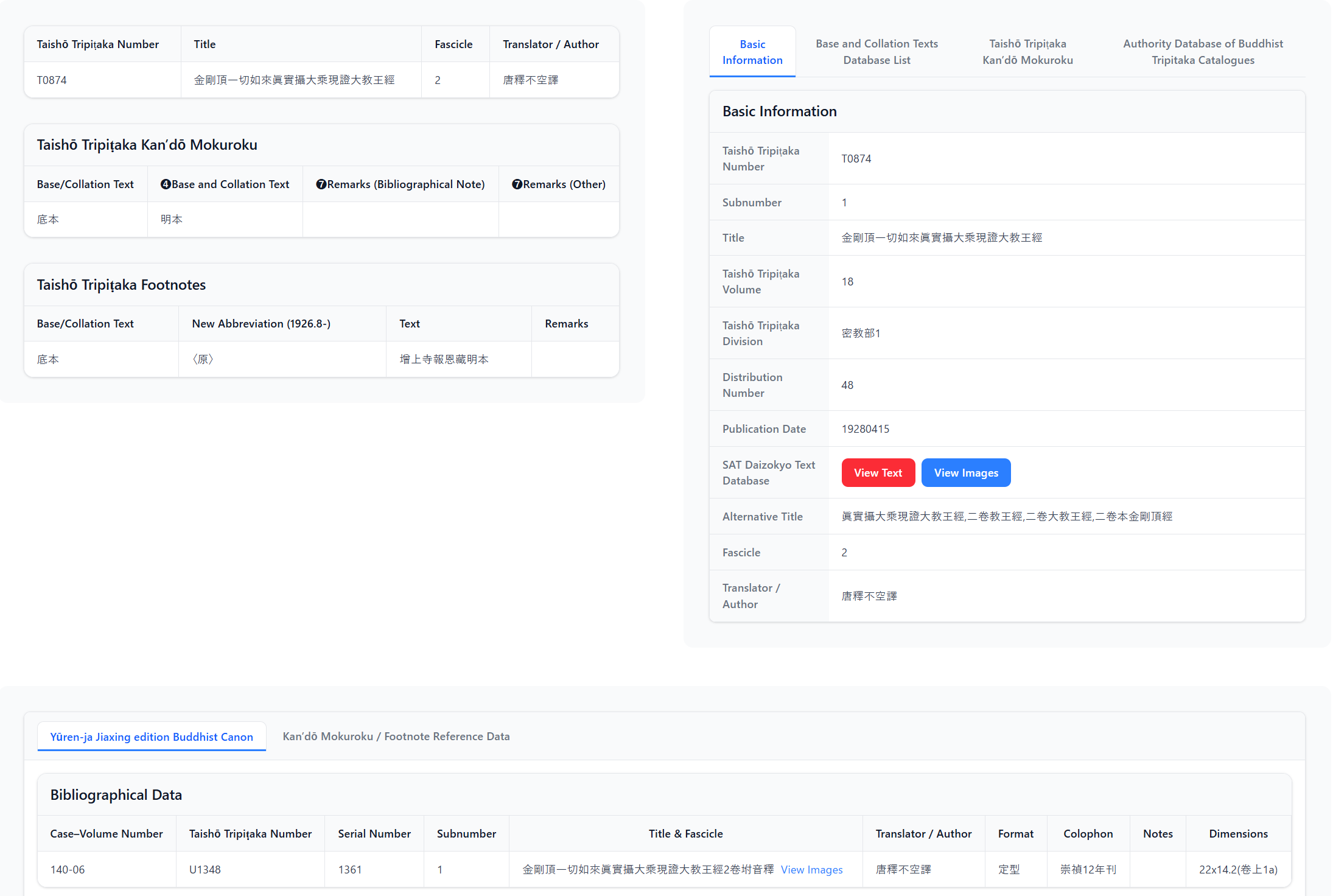
【Basic Information for the Text】
Basic information on the text of the scripture as recorded in the Taishō Tripiṭaka Kan’dō Mokuroku and in the Taishō Tripiṭaka footnotes.
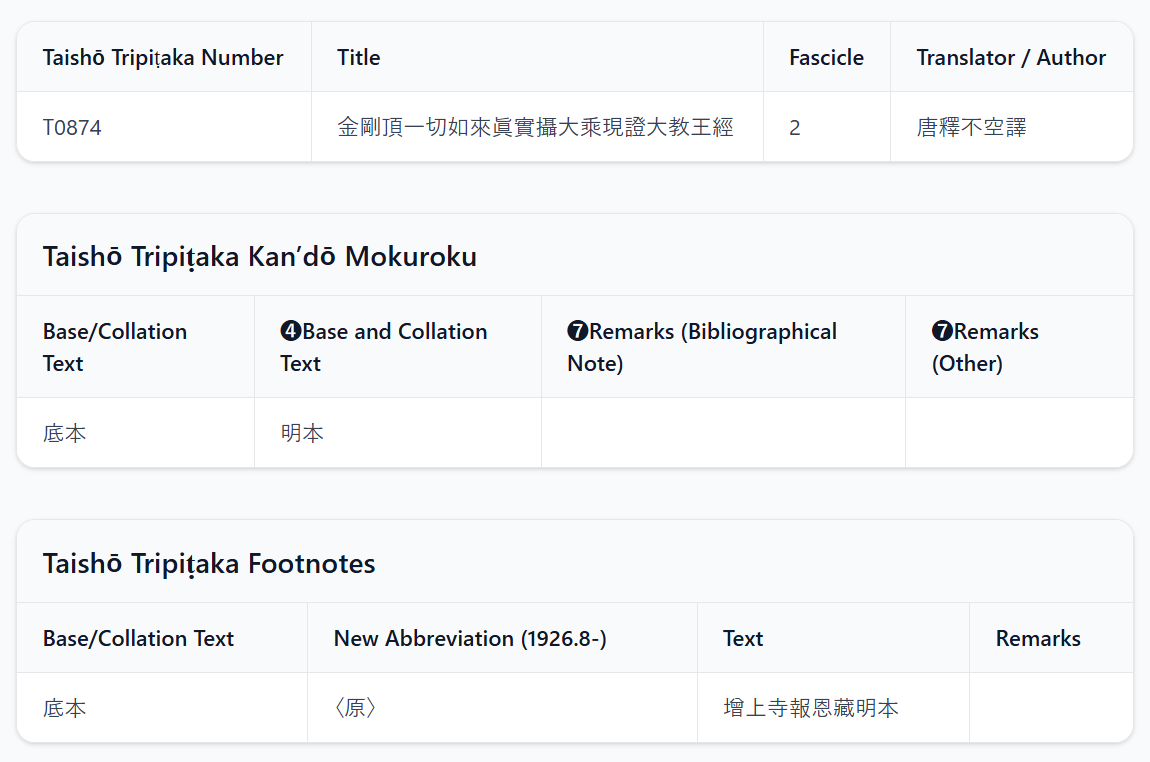
【Basic Information for the Scripture】
Displays the Taishō Tripiṭaka scripture number, title, volume number, division, distribution unit (part), first edition publication date, a link to the SAT Taishō Tripiṭaka Text Database, alternate titles, number of fascicles, and translator/author.
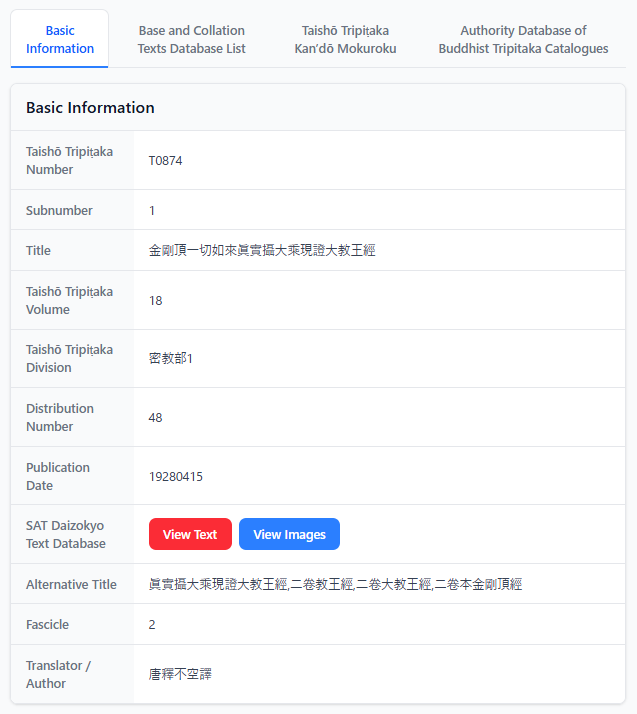
Clicking “View Text” under “SAT Taishō Tripiṭaka Text Database” opens the beginning of the text data on the external SAT site (left below). Clicking “View Images” opens the page images of the Taishō published by SAT (right below).

【Base and Collation Texts Database List】
Displays a list of information related to base and collated texts for the scripture. Clicking “Details” opens the “Detail Information” for the selected text.
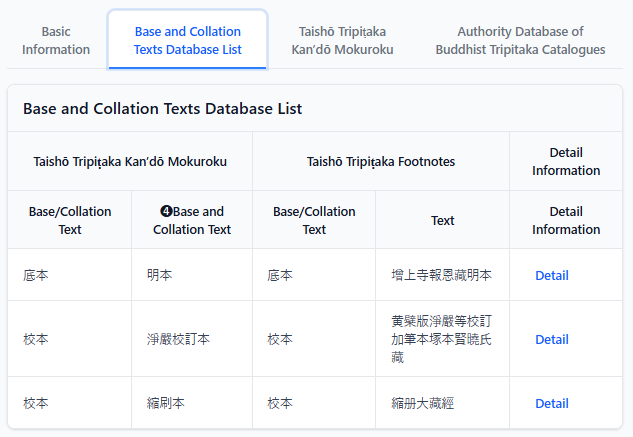
【Taishō Tripiṭaka Kan’dō Mokuroku】
This tab shows, for scriptures recorded in the Taishō, the following items from the Taishō Tripiṭaka Kan’dō Mokuroku (Catalogue of the Collations for the Taishō Tripiṭaka): title; number of fascicles; ❶ names (Japanese, Chinese, Sanskrit, Pāli, Tibetan, plus alternate and abbreviated titles); ❷ translator/author and date of translation/authorship; and ❸ locations within other canons (Koryŏ, Song, Yuan, Ming, Reduced-size Canons, Manji, and the Nanjō Catalogue (NJ)).
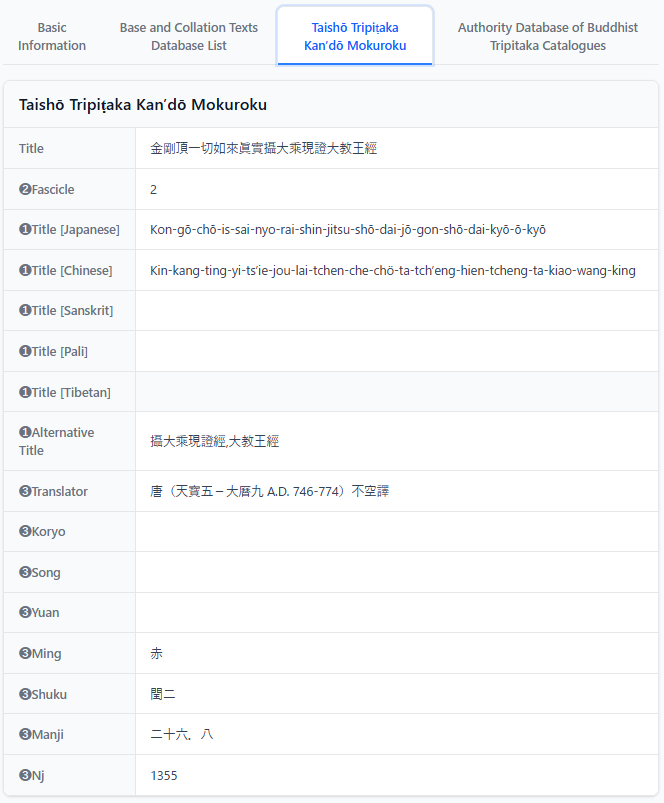
【Authority Database of Buddhist Tripitaka Catalogues】
Clicking “Standardized Identifier” or “Author / Translator” opens the corresponding page on the external site “Authority Database of Buddhist Tripitaka Catalogues”.
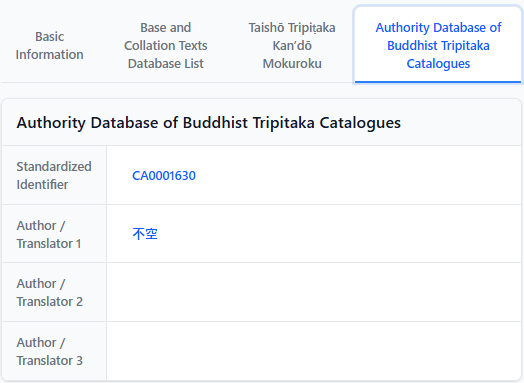
【Detail Information on the Text】
At the bottom of “Detail Information,” tabs provide further details on the text. The four tab types are: “Kan’dō Mokuroku / Footnotes: Reference Data,” “Yūren-ja Jiaxing edition Buddhist Canon,” “Buddhist Texts Bibliographic Database,” and “Imperial Household Agency Shoryōbu Song-edition Buddhist Canon.” Tabs other than “Kan’dō Mokuroku / Footnotes: Reference Data” appear only when relevant data are available. Click a tab to switch views.
“Kan’dō Mokuroku / Footnotes: Reference Data” tab
Provides more detailed information on the Catalogue of the Taishō Tripiṭaka Kan’dō Mokuroku and on the footnotes to each Taishō volume.
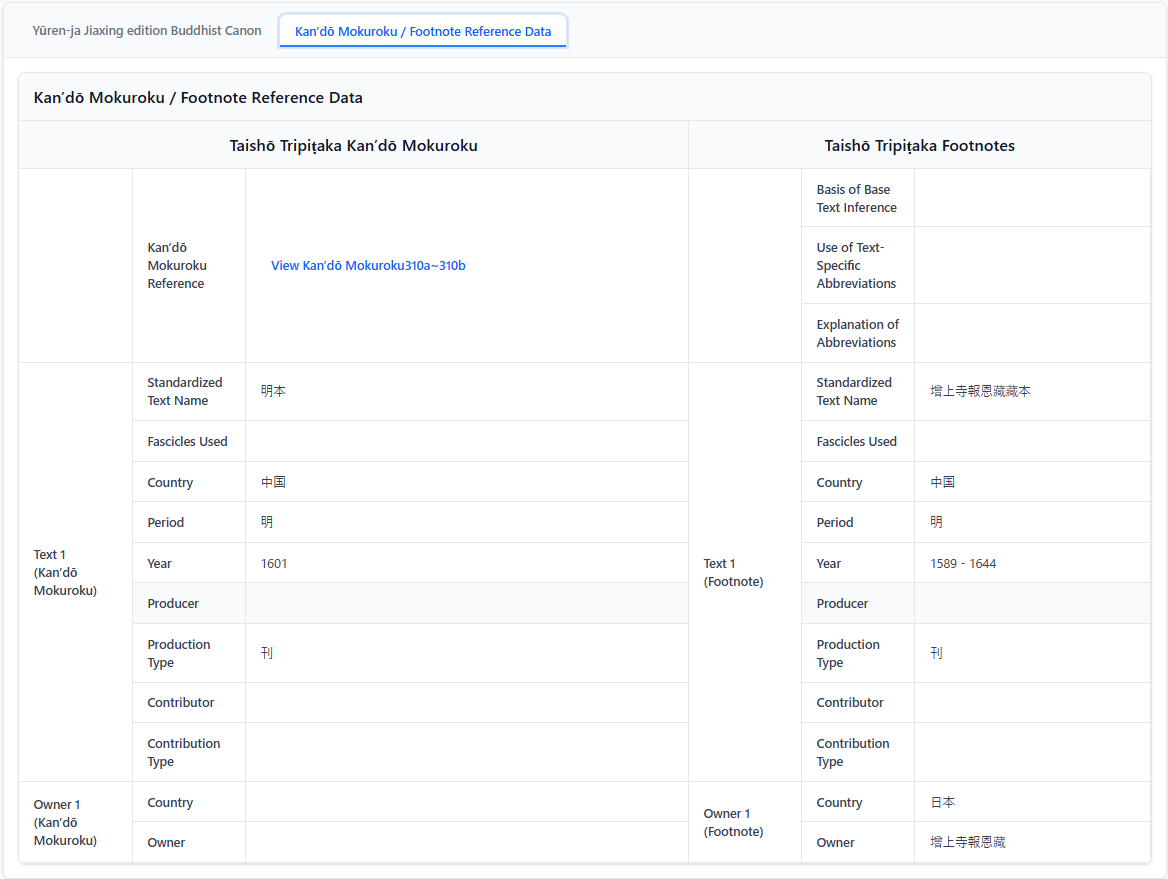
“Yūren-ja Jiaxing edition Buddhist Canon” tab
Bibliographic information for the Yūren-ja edition is shown at the top, with a detailed table of contents below.

Clicking “View Images” opens the images for the Yūren-ja edition.
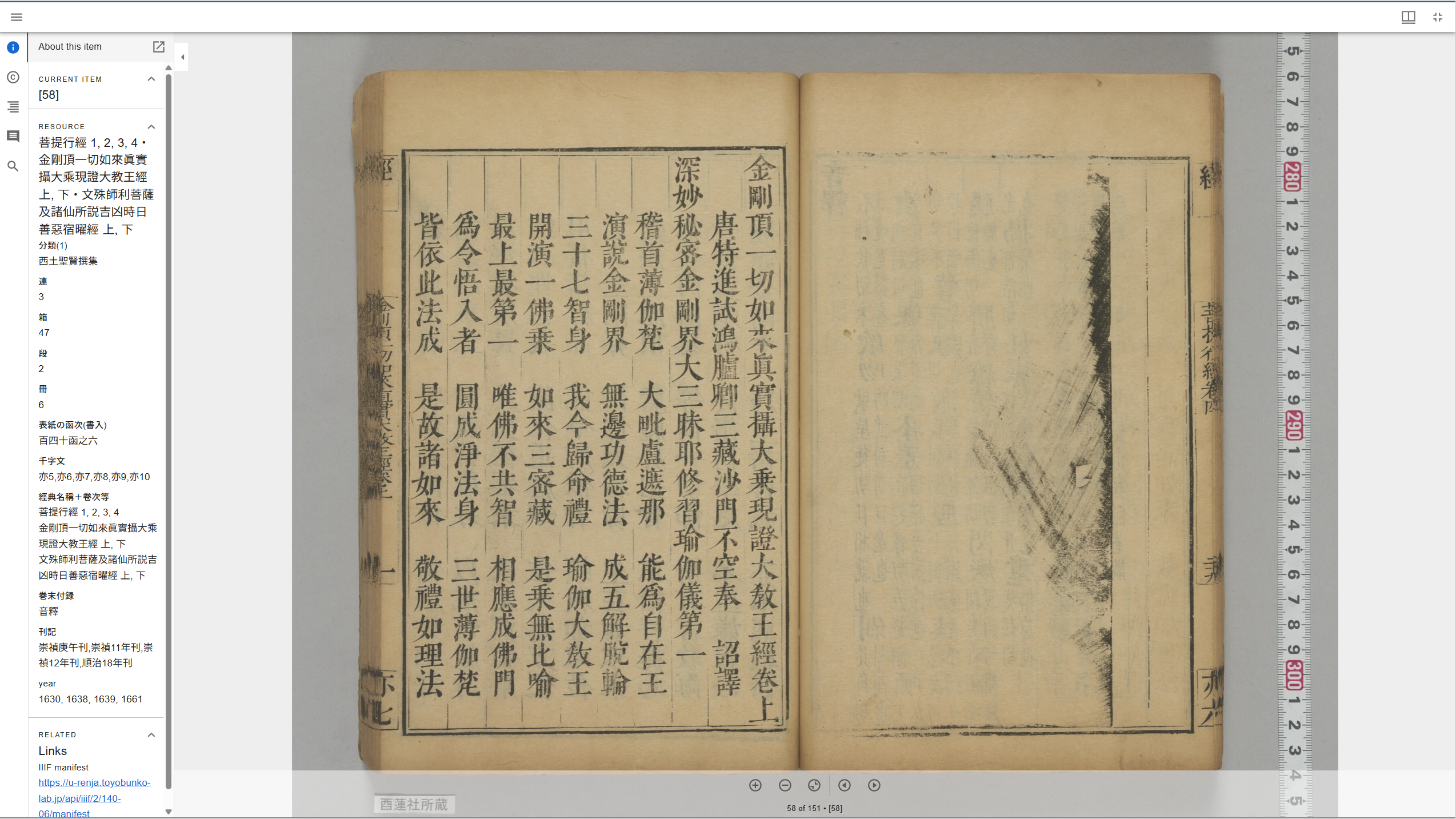
In “Detailed Table of Contents,” you can view the Yūren-ja bibliographic information by fascicle. Clicking “Details” opens the detailed record for the selected fascicle.
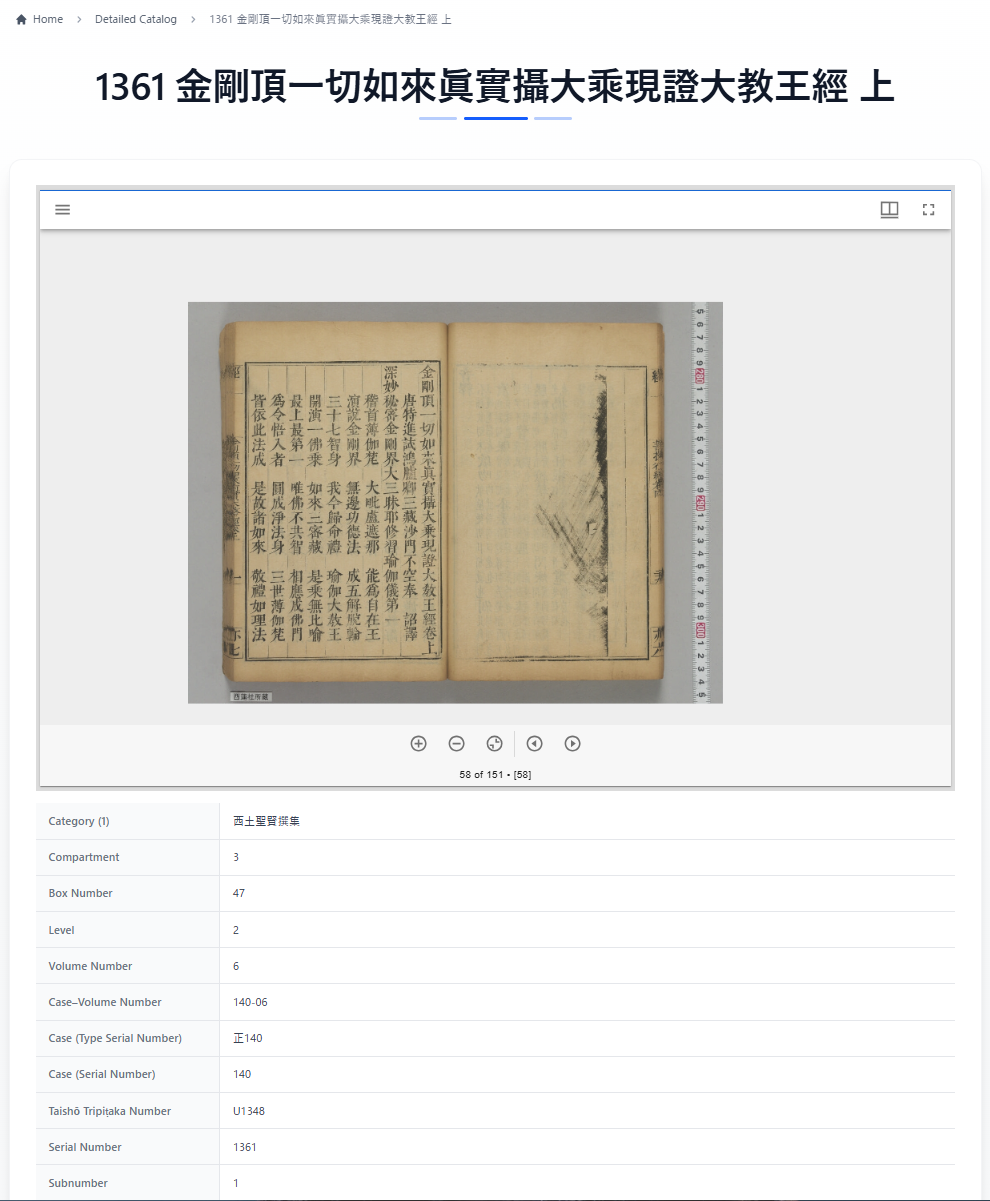
For the seventy-three volumes of the Yūren-ja edition photographed by SAT (e.g., the Fangguang Banruo Bore jing), clicking “View Images” redirects to the images published by SAT.
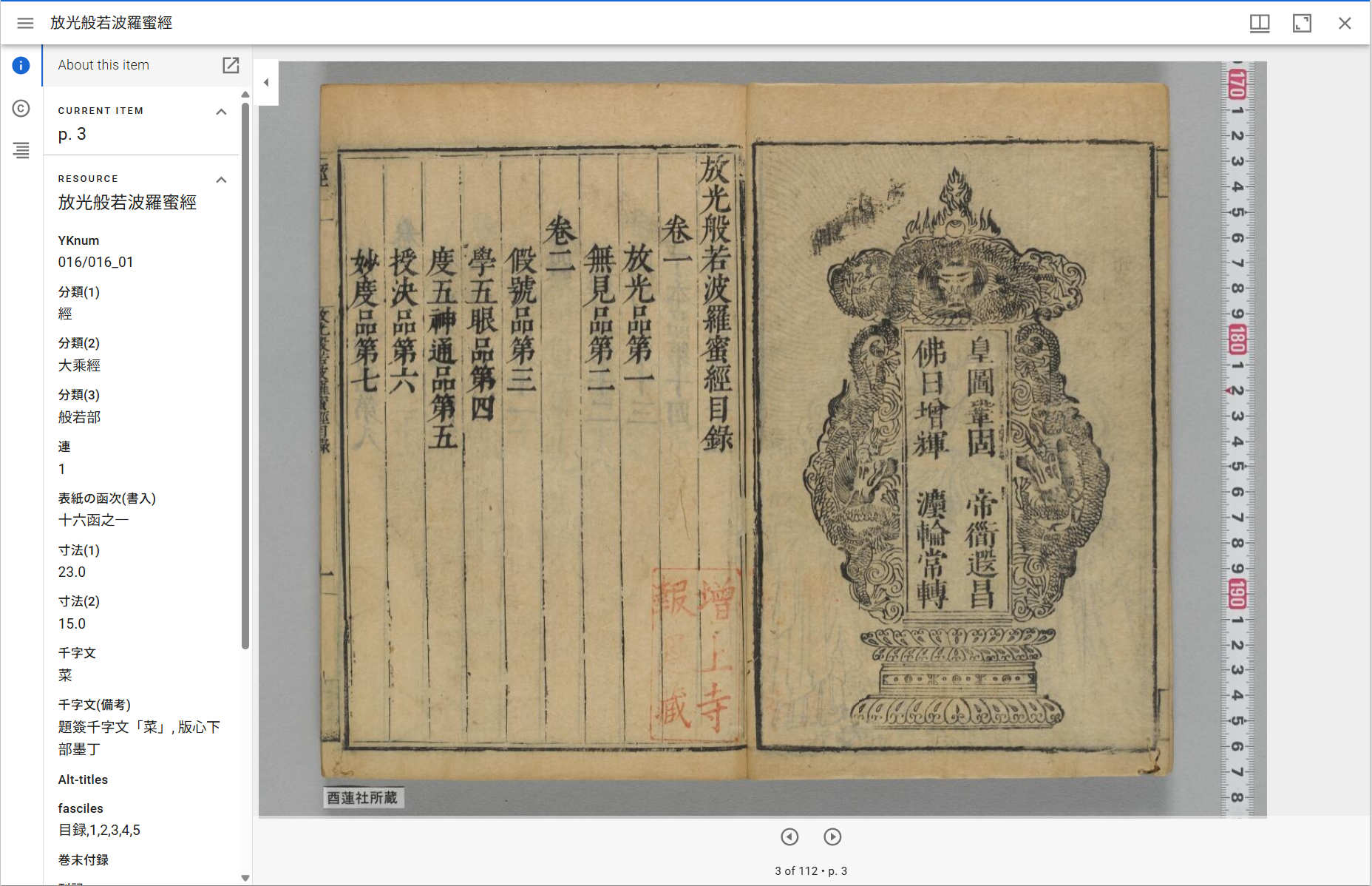
“Buddhist Texts Bibliographic Database” tab
We conducted bibliographic surveys at university libraries holding the original manuscripts and printed editions used as base and collated texts for the Taishō Tripiṭaka and digitized the bibliographic information and images. The “Identification Level (with the Taishō Tripiṭaka)” field shows whether the item is judged to be the very text used as a base or collated text for the Taishō Tripiṭaka . We plan to publish the grounds for these judgments in due course.

Clicking “Bibliographic record at holding institution” opens the external site.

Clicking “Details” opens the Buddhist Texts Bibliographic Database.
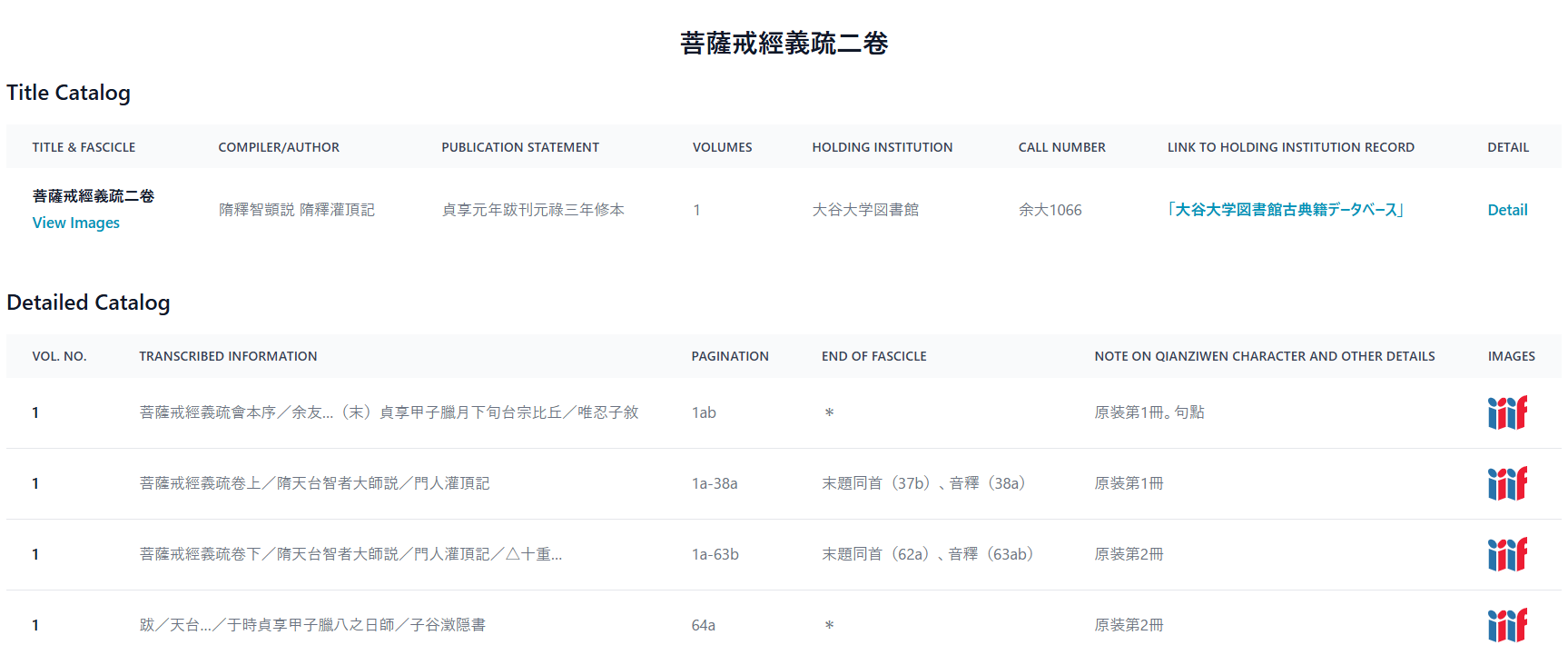
Clicking the IIIF icon opens the images for the selected fascicle.

For items held by Ryukoku University Library, you are redirected to images published on the external site “Ryukoku-zō.”

“Imperial Household Agency Shoryōbu Song-edition Buddhist Canon” tab
The table of contents for the Kyūhon is displayed by fascicle. Clicking “View Bibliography” or the IIIF icon opens, respectively, the bibliographic record and the page images for the scripture on the external site “Catalogue of Chinese Books in the Collection of the Imperial Household Agency Shoryōbu.” Clicking “Hosting Site” takes you to that site’s top page.

The page below shows the “Catalogue of Chinese Books in the Collection of the Imperial Household Agency Archives and Mausolea Department.”

